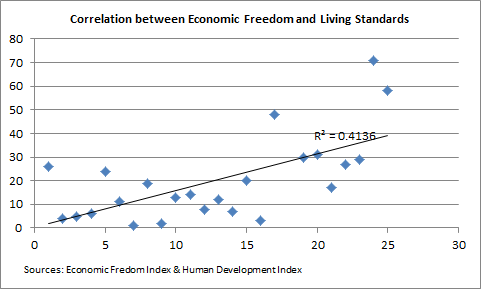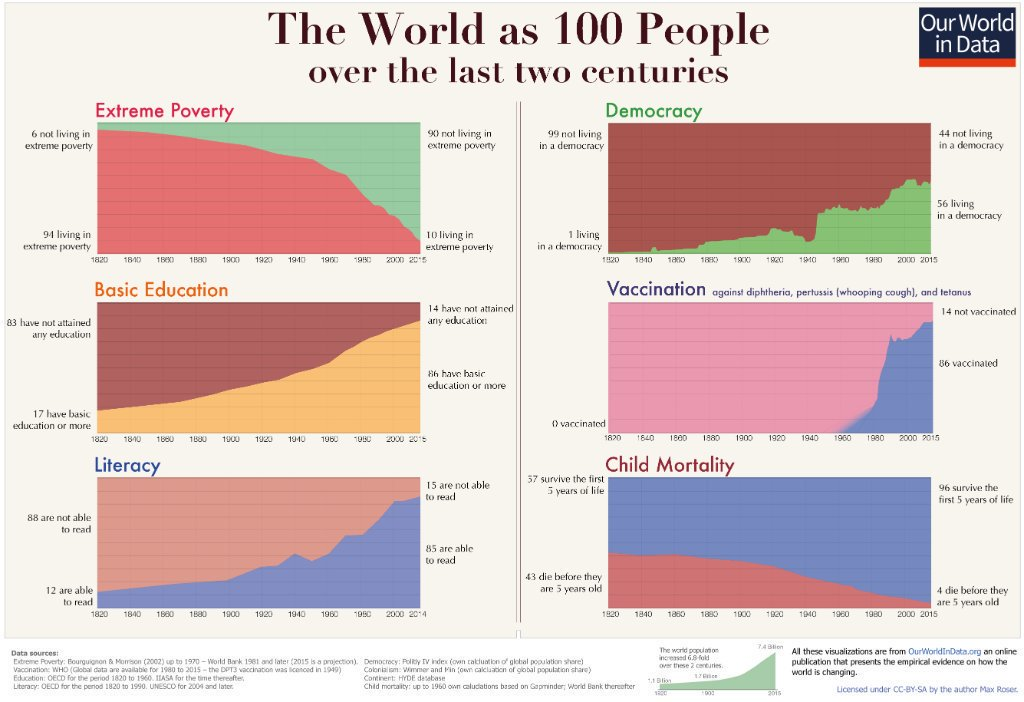I am going to spend some time trying to put the debate about Capitalism and Socialism into perspective here. But before we can do that I need to properly define the terms because they’re used in a rather lazy manner in the mainstream media. So, let’s establish some understandings:
Capitalism – a system in which the means of production are privately owned and the economic benefits of that production are distributed by the owners and regulated by the government.
Socialism – a system in which the means of production are owned by society as a whole and distributed based on contribution while being regulated by the government.
It’s worth noting that Capitalism and Socialism don’t really exist in a pure form. Pure Capitalism would have no government at all and all private property would be individually owned and everyone would just kind of mind their own business. Of course, that’s not practical because we’re inherently social animals and we step on each other’s toes (and fix other people’s toes) all the time. We’re stronger as a unit than we are individuals, or something like that. But we’re also not all equal (sorry founding fathers). We all have different strengths and can contribute to our collective well-being in different ways. This is good. The human race is like one big diversified portfolio of individual achievers who make individual contributions of varying size and importance, but are stronger as a whole. Likewise, there are no purely Socialist economies in the world because while we’re better as a whole there is logic in individual freedoms that optimize outcomes based on incentives.
The natural result of this is that you tend to get a blend of Socialism and Capitalism in modern economies. For instance, the US military is a Socialist program that is owned mainly by the government and distributes income from society as a whole based on the contribution that participants make to the military. This is a good system since it’s difficult for a Capitalist to make money blowing things up and sending your workforce to get hurt or die. It also serves the collective good in many ways. But most of the means of production in the USA are privately owned and distributed by the individual owners.
Another common misunderstanding in the media is that Scandinavian countries are Socialist. This isn’t really accurate. These countries are also a blend with a predominantly private ownership of the means of production. For instance, in Norway, a country that is one of the more “Socialist” countries of the bunch, the government has about a 40% stake in corporations and private property is mostly owned by individuals. So this economy is still a predominantly capitalist economy, but it has a hefty dose of Socialism blended into it. But even in this case competitive market forces still rule the roost as the corporations are accountable to shareholders.
It’s impossible to analyze these systems in a vacuum because they’ve never existed in a pure form. One thing we do know is that many Socialist economies have been more susceptible to authoritarian control and lower living standards. A decline in individual freedoms often results in a power grab as has been seen in places like Cuba, USSR, Venezuela, North Korea, etc. On the other hand, countries with a blend of the two with a tilt towards Capitalism have tended to fare much better. There is strong evidence that predominantly Capitalist countries correlate with higher living standards. Below we can see the correlation between the Human Development Index (a broad measure of living standards) and the Economic Freedom Index (an index measuring how much individual freedom an economy has). Given all the variables the correlation is not bad.

(Given all the variables, not bad!)
There is also strong evidence that global living standards are rising as Capitalism has become the dominant economic system used around the world. This image does a nice job of capturing the fact that the world is getting better:

Of course, Capitalism is imperfect. As Churchill might have said, it is the worst system except for all the rest. Capitalism will tend towards monopolization and even cronyism. And I think there are legitimate arguments that we’re seeing this in parts of the world. And this explains the rational rise in the popularity of Socialism. This has become a particularly important issue in industries where Capitalism appears to be failing us.
I should be clear here. The reason this website is called “Pragmatic Capitalism” as opposed to “Radical Capitalism” or something like that is because I think Capitalism is a mostly good system with the potential for doing some bad things at the same time. So, for instance, I think Capitalism is perfectly suited for most industries like technology, manufacturing, automobiles, etc because competitive profit based forces will drive out the bad, reduce prices and lead to productive advancement. A profit motive is good across most industries. This is less true in something like national defense, fire fighting, correctional facilities and even healthcare. These are sectors of the economy where there is an inherent conflict of interest between doing good and making money. So, I think you could make good arguments for many sectors to be more socialized while also maintaining a predominantly Capitalist economy.
That seems to be the debate we are presently having in American politics. It’s not whether we’re going to be Capitalist OR Socialist. It’s really about how much Socialism we are willing to allow around our predominantly Capitalist structure. That is an important debate to have. I am not sure I have the right answers, but I hope this post helped put some things in perspective for you as we navigate this debate.
Mr. Roche is the Founder and Chief Investment Officer of Discipline Funds.Discipline Funds is a low fee financial advisory firm with a focus on helping people be more disciplined with their finances.
He is also the author of Pragmatic Capitalism: What Every Investor Needs to Understand About Money and Finance, Understanding the Modern Monetary System and Understanding Modern Portfolio Construction.

